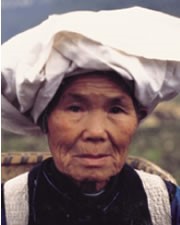Pala in Laos

Photo Source:
Copyrighted © 2026
Operation China, Asia Harvest All rights reserved. Used with permission |
Send Joshua Project a map of this people group.
|
| People Name: | Pala |
| Country: | Laos |
| 10/40 Window: | Yes |
| Population: | 6,200 |
| World Population: | 6,200 |
| Primary Language: | Akha |
| Primary Religion: | Ethnic Religions |
| Christian Adherents: | 0.00 % |
| Evangelicals: | 0.00 % |
| Scripture: | Complete Bible |
| Ministry Resources: | Yes |
| Jesus Film: | Yes |
| Audio Recordings: | Yes |
| People Cluster: | Tibeto-Burman, other |
| Affinity Bloc: | Tibetan-Himalayan Peoples |
| Progress Level: |
|
Introduction / History
The Lao government does not count the Pala as a distinct ethnic group. It is probable they were officially counted as part of the Akha in the 1995 census, even though the Pala have a different autonym and language from other Akha groups in Laos.
Where Are they Located?
The Pala live in a mountainous area near the Oma, a group they share some cultural and linguistic similarities with. The Pala are an isolated group, living at an altitude of between 800-1500 meters (2,600-4,920 feet) above sea-level. The Pala are considered relatively closed to new ideas and development. They mostly trade with the Lao and the Khmu. On occasions they venture down to the market in Koua where they buy and barter for products they need.
Pala people inhabit 26 villages in northern Laos. Fourteen Pala villages are located within the Mai District of Phongsali Province, with an additional 12 villages in Koua District.
What Are Their Lives Like?
Pala women wear traditional clothing which they produce in their village. These days, they mostly wear their traditional clothes on festival days or when they go to the market. They add decorations of coins and aluminum to give a striking appearance. The women also adorn themselves with embroidered aprons, vests, trousers, and turbans. Both men's and women's everyday clothing are made of simple blue indigo cloth.
What Are Their Beliefs?
Animism and ancestor worship are the dominant religious beliefs among the Pala. Every home has a sacred ancestral altar where they make rituals and offerings at appointed times. The Pala worship other spirits and deities. Every June, after they plant the rice harvest, they hold a ceremony called Tgelapeu to honor the spirits of the village and the harvest. Other religious ceremonies are held whenever there is a birth, death, or wedding among the Pala. A spirit-priest is called upon to officiate. He acts as a mediator between the Pala and the spirits, taking the people's requests and prayers to the realm of the spirits.
What Are Their Needs?
The Pala are completely unreached by the gospel. Few have ever heard of Jesus Christ. Possibly the only Christian community in southern Phongsali is among the Khmu. They may represent the best opportunity for the Pala to hear.
Prayer Points
Ask God to send Khmu Christians to share Christ with the Pala. Pray for smooth communication.
Pray the Holy Spirit would draw many Pala to himself.
Pray the Lord would put a desire to seek the truth in the hearts of many Pala people in Laos.